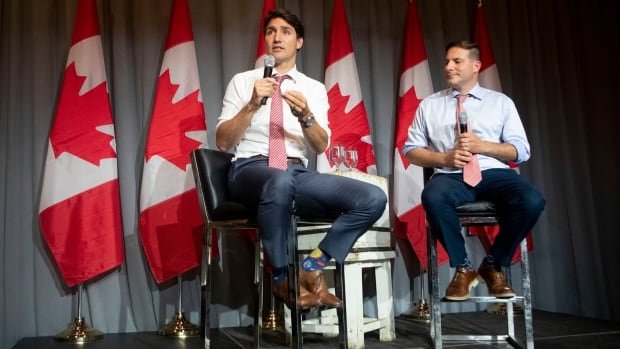One of Canada’s top public servants asked that a false article about Prime Minister Justin Trudeau be removed from Facebook during the 2019 election, according to testimony Friday and documents filed in a public inquiry into foreign interference.
The article in question was published in the Buffalo Chronicle. It contains unsubstantiated claims about Prime Minister Trudeau that were circulated online during the 2019 election cycle.
The Buffalo Chronicle, a New York local news website, has been accused of publishing false and misleading articles about Canada during and after the 2019 election.
Documents submitted with the investigation show that the claims in the article were discussed at the highest levels of the Canadian government.
A transcript of an interview with Privy Councilor Allen Sutherland submitted with the inquiry says he claimed Facebook brought the story to his attention.
Mr Sutherland’s interview with a lawyer representing the Commission on Foreign Interference, which is conducting the investigation, said: “The content could have attracted significant attention if expanded and therefore posed a risk to the integrity of the election.” ” is written.
“At the direction of Ian Shugart, then Clerk of the Privy Council, Mr. Sutherland asked Facebook to remove the article. Facebook complied.”
Sutherland said the government did not release this information because the online “information ecosystem” debunked the false report, according to the attorney’s memo.
Sutherland said government officials asked whether the request to remove the article merited publication, but determined that doing so could amplify misinformation.
WeChat handles misinformation differently
Ahead of the investigation, a lawyer representing Conservative MP Michael Chong has spoken out about the government’s response to a Buffalo Chronicle article about Erin O’Toole’s Conservative Party that was circulated on social media platform WeChat during the 2021 election. He pointed out the difference in the government’s response to multiple false articles.
Sutherland believed the two cases were separate, according to the documents. WeChat articles are written in Chinese, meaning the content likely only reaches Chinese readers.
Similarly, Sutherland said the Buffalo Chronicle article presented inflammatory information that directly targeted the Prime Minister’s character, while the WeChat posts, even if they contained falsehoods, were about policy issues. He said it was.
“Are you less concerned about misinformation targeting the Chinese diaspora than you are in the English-speaking world?” lawyer Gib van Ert asked.
“I said the Buffalo Chronicle article was so inflammatory that it was seen as having the potential to go viral and become a national event,” Sutherland said.
Representatives of the Conservative Party, including former leader O’Toole, have joined the inquiry, saying Chinese foreign interference in its dispute with the large Chinese diaspora communities in British Columbia and Toronto will hurt the party in the 2021 election. He said he believed he could have lost up to nine seats.
Some of the stories CSIS and other watchdogs highlighted in 2021 concerned Mr. O’Toole’s promises regarding China, but others were more personal in nature. An article about a private member’s bill calling for the Foreign Influence Registration Act, proposed by former Chinese Communist Party lawmaker Kenny Qiu, calls Qiu “anti-China.”
Another said O’Toole would “ban WeChat if elected” and described him as “Canada’s version of Trump” and said he was “significantly more radical and tough on China” than his predecessor, Andrew Scheer. ”
Sutherland said officials must be careful about setting thresholds for responding to falsehoods during elections, saying setting the threshold too low could be an attempt to sow doubts about Canadian democracy. He said it could be detrimental to the objectives of his adversaries.

